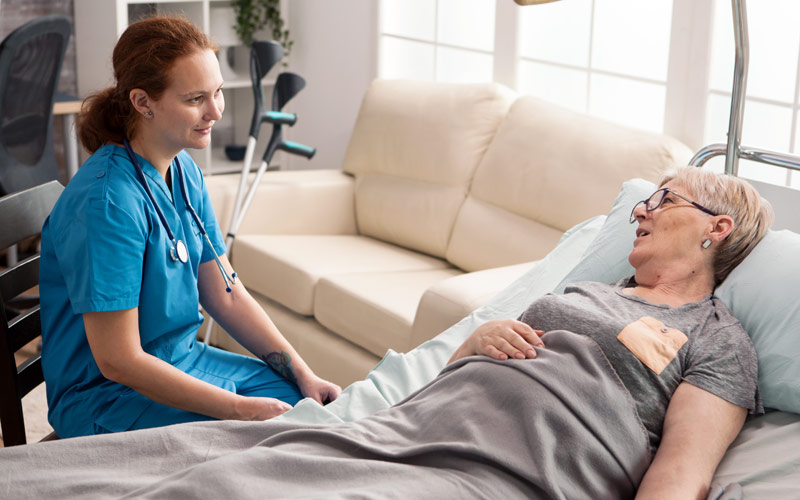When your loved one suffers from a serious chronic or terminal illness where a cure is improbable, and treatment is unlikely to change or slow its course, your family may have difficult decisions to make. This can be a particularly stressful time for everyone involved and the services of a hospice organization can assist with making end of life decisions as well as provide care and services to your family. Those hospice services are often provided at the patient’s home.
What Is the Purpose of Hospice Care?
Hospice can provide emotional, medical, spiritual, and physical support to your loved one. Hospice can also provide comfort through a team approach that can involve a doctor, nurse, chaplain, social worker, volunteer and home health aide; all of whom can be specially trained to address the needs of hospice patients. The goal of hospice can be to ensure that a person’s last days are as pain-free as possible, that he or she maintains their dignity and that the family and caregivers receive the support needed during that time.
Types of Hospice Care
Hospice services can be provided in a home setting such as the patient’s private home, an assisted living center, or a group home. Services can also be provided in an inpatient facility such as a hospital, nursing home or a special hospice care center. Typically, hospice services in inpatient facilities may be limited to patients who have a life expectancy of a few weeks or less. In contrast, hospice home care can be provided to patients with life expectancies of zero to six months.
Why Choose In-Home Care?
Typically, the individual may choose whichever setting he or she prefers for hospice services, unless he or she is ineligible for inpatient hospice services due to life expectancy or other circumstances. Hospice care at home can have several advantages.
- Your loved one can receive personalized services from a team of caregivers that can remain consistent throughout the progression of the illness. As a result, your loved one can form a bond with the hospice care team that may not be achieved in a facility setting where staff may frequently change.

- Your loved one can receive care in a familiar environment. Coming to terms with the finality of life can be stressful enough and being in one’s own home environment with family, pets and personal treasures can ease some of the stress and anxiety.
- While some inpatient facilities may restrict the presence of pets, at home a beloved family pet can raise spirits and boost morale. Studies have determined that the comfort of a pet can even reduce physical pain, anxiety, boredom and blood pressure!
- You and your loved one can reach out to hospice staff seven days per week, 24 hours per day with any questions, concerns or issues that you may have. If necessary, a hospice nurse can come out to the home to deal with any emergencies that may arise which can eliminate the need for a trip to the emergency room.
- The family can receive training on how to take care for your loved one and get information on what to expect as the illness progresses.
- Your loved one can have more control over the environment and timing of visits from the hospice care team based on his or her needs and desires. If your loved one doesn’t want to be disturbed or prefers a totally quiet environment, it can be achieved easier in a home setting than in a facility where there may be interruptions from staff coming and going to check vitals or noises from machine alarms, intercoms and paging systems.
- Home health aides can come to the home to assist with activities of daily living such as bathing, dressing, and feeding.
- A nurse can be assigned to monitor your loved one’s condition and arrange for services, medications, supplies and equipment that may be needed as the condition progresses. This could include a hospital bed, portable toilet, oxygen, diapers or even a chaplain if desired.
- A nurse can be present to provide support and comfort when death is imminent and grief support can be provided to the family and caregivers after the death of their loved one.
Although there may be many advantages to hospice care at home, it may not be for everyone. If a person lives alone without the support of family or friends, hospice services at a facility may be more appropriate. Likewise, if the patient lives with family that may not be able to commit the time needed to provide hospice care, or may not be emotionally or physically able to provide the care, in-patient care at a facility may be better option.
Click here to to learn more about hospice care or home health care.

